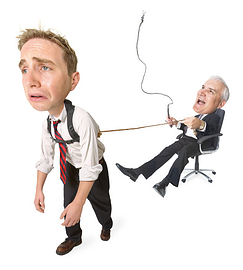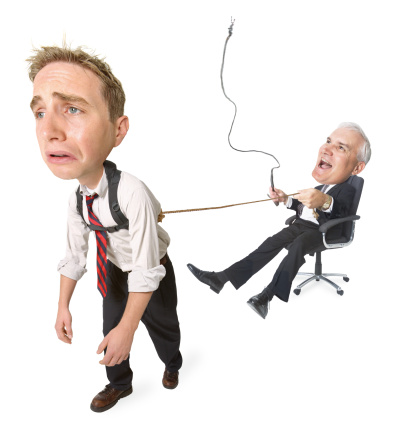 Yet another study analyzing the impact of "bad bosses" has been completed. This one is by the Université Francois Rabelais, and published in the Journal of Business and Psychology.
Yet another study analyzing the impact of "bad bosses" has been completed. This one is by the Université Francois Rabelais, and published in the Journal of Business and Psychology.
Their conclusion:
"Our study shows that both organizational and managerial factors have an influence on satisfying or frustrating the basic psychological needs for autonomy, competence, and how we relate to others. We have shown, for the first time, that the fulfillment and frustration of these needs plays a central role in the improvement or reduction of well-being at work. Therefore, to satisfy employees' needs, supervisors should provide subordinates with options rather than use threats and deadlines, a strategy which could improve their workforce's well-being."
The study found that the more employees felt that their supervisor supported their autonomy, the more the employees' needs for autonomy, competence and relatedness were met and the happier and more satisfied they were.
Imagine that.
Guess what happens when you give more freedom to an employee who cannot do the job?
That is correct... You get more work not being done correctly. However, those who do the job right will see an increase in autonomy.
When the work is not being done correctly, good managers reduce employee autonomy until the employee proves they can do the job well.
Which begs the question. Is the problem really bad bosses or bad job fit?
And yes... I realize that bad bosses do exist and in most cases (not all) they eventually get "weeded out".
Think about it for a second… A manager's responsibility and duty to the organization is to supervise, correct, and guide the performance of those below him or her. If a team member is in a position that is not a good fit based on his or her behaviors, values, and personal talents, what is going to happen? Chances are VERY HIGH that he or she will perform below expectations for that position and that his or her performance will need to be corrected by the manager. Autonomy will be reduced. Guaranteed.
When this happens the employee will likely begin to ask themselves questions like, "Why can't he/she just let me do my work?", "Isn't anything I do good enough?", or "why is he/she such a jerk?"
When the employee is not doing their job and the boss holds them accountable and reduces their autonomy, many people will begin to characterize their supervisor as a "bad boss".
Ever met someone who was not doing their job who loved their boss? Me neither.
People who do not fit the job almost always fail to put the blame on themselves. They blame the chair they sit on, the people around them, their equipment, and yes - the boss who is trying to get them to do what they are paid to do - their job - which they cannot do effectively.
How exactly do you determine the root cause of the job fit problem? I suggest you consider the following strategy I have found to be very effective:
- Use Job Benchmarking to determine what is truly needed for success in the position. Until you know what is really needed to be successful in a particular position, you cannot assess how well a given candidate or team member fits the job.
- Have your team members complete a personality profile and compare the results against the job benchmark.
- Ensure that your team members are in the right position based upon how well they fit the job and help those who are not a good fit for their position to find a more suitable position in your organization.
The wrong people in the wrong positions will spell disaster. While the right people in the right positions will take your organization to new heights never before imagined.




